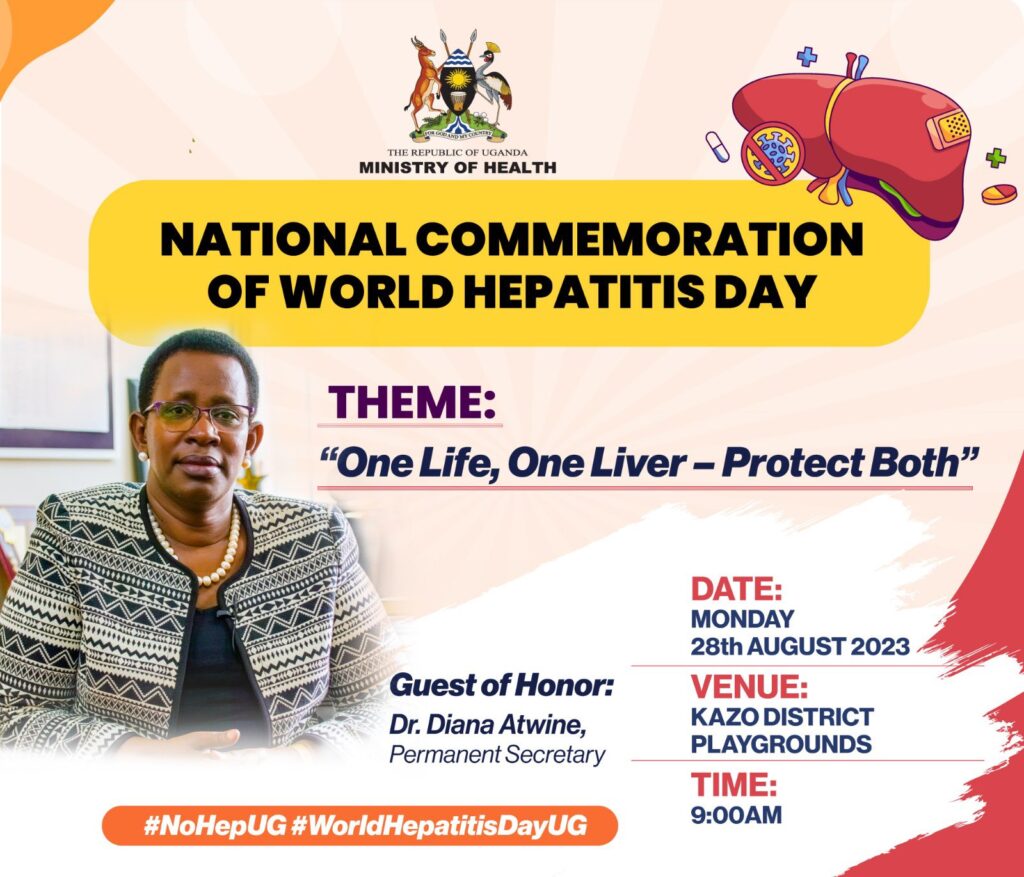Today, all roads lead to Kazo District playgrounds where the Ministry of Health will be commemorating World Hepatitis Day.
Officials led by the ministry’s Permanent Secretary, Dr Diana Atwine, (chief guest) will gather at the the function that seeks to raise awareness about the viral disease under the theme; “One life, one liver – Protect both.”

The day gives an gives us an opportunity to join all stakeholders such as the World Health Organization and the World Hepatitis Alliance to raise awareness on the public health importance of this silent killer and to call on Member States to invest more in the fight against Hepatitis.
To mark this day, the ministry lined up a series of activities to including Twitters spaces, sports activities and a community dialogue all aimed at raising awareness about the viral disease.
According to the UPHIA 2016 report, the prevalence of Hepatitis B among adults aged 15-64 years stands at 4.1%. However, the prevalence among men is higher at 5.4% and women at 3.0%.
DETAILS
Emmanuel Lutamaguzi, 28, unexpectedly discovered he was infected with hepatitis B during a routine medical examination for a job opportunity abroad. His wife and baby boy both tested negative and received a vaccine to prevent them from getting the disease.
Emmanuel had no symptoms but recognized hepatitis B is the leading cause of death from liver diseases and cancer in Uganda. Driven by his personal experience, he recognized the need to raise awareness and help eliminate the disease, and he founded the Hepatitis Aid Organization in Uganda.
“We can triumph over even the most formidable health challenges,” says Emmanuel.

A 2014 World Health Assembly resolution called for governments and populations to take action to prevent, diagnose and treat viral hepatitis. Globally, more than 80% of people living with viral hepatitis B and C do not know they have it, and 3 000 people die of the disease every day. WHO’s global hepatitis strategy, endorsed by all WHO Member States, aims to reduce new hepatitis infections by 90% and deaths by 65% between 2016 and 2030.
The problem of hepatitis B in Uganda
Hepatitis B is a major cause of ill health and death, leading to complications including liver cirrhosis and cancer. In 2022, an estimated 1 250 Ugandans died of the disease, and around 6% of Uganda’s population remains chronically infected. The Ministry of Health of Uganda, with technical support from WHO, subsequently developed a strategy to control hepatitis B, including public awareness raising, testing, and treatment nationwide.
Hepatitis services are free of charge
With investments of around 3 million US dollars a year, and working in partnership with national stakeholders, Uganda embarked on a massive, free hepatitis B screening programme in 2015, along with widespread community mobilization and awareness-raising actions.
“The Ministry of Health took strategic and powerful action to address viral hepatitis infection in Uganda. The government will continue its efforts to provide free testing and treatment for all affected by hepatitis infection. Viral hepatitis can no longer be ignored. I, therefore, urge all Ugandans to come forward, test and know their hepatitis status. Mothers and caregivers should also endeavour to have their babies receive the hepatitis B birth dose and complete their pentavalent vaccine schedule,” said Dr Rachel Beyagira, Technical Officer on Hepatitis at the Ministry of Health Uganda.

With over 4 million people screened to date, the programme is having an impact. More than 30% of people infected with hepatitis B are aware of their status and can access comprehensive treatment services, including free medication. Around 90% of all infants receive childhood vaccinations. This success made Uganda the first country in Africa to reach and surpass WHO’s 2020 programme targets of diagnosing 30% of people living with hepatitis B, ensuring awareness of and access to care.
“You can live a full, dignified life with hepatitis B, but the most important thing is prevention, especially vaccination in new-borns. For adults, testing, linking to care, education and treatment as needed are crucial; and lifelong therapy is often needed. The hepatitis community eagerly await the new WHO hepatitis B guideline that will provide guidance to simplify service delivery and ensure that more people are on treatment,” says Kenneth Kabagambe, founder of Uganda’s National Organization for People Living with Hepatitis B, a key partner in Uganda’s effort to combat viral hepatitis.
Alongside support to the government to develop national strategic plans for hepatitis, WHO together with civil society, strongly advocated for earmarked funding for hepatitis activities, and the government responded with dedicated funding for the past 5 years. WHO also conducted a rapid evaluation of the entire hepatitis programme in Uganda and provided tailored guidance based on local contexts. It also undertakes periodic reviews and updates to national hepatitis management guidelines and develops training tools to strengthen the capacity of health workers.
“WHO is proud to support the Government of Uganda, and other national partners, in their efforts to tackle and eliminate viral hepatitis. We commend Uganda for providing free access to hepatitis testing and treatment. It is the only way to ensure health for all and it also requires strengthening adherence to care to reduce mortality,” said Dr Yonas Tegegn Woldemariam, WHO Representative to Uganda.
Additional reporting by WHO
















